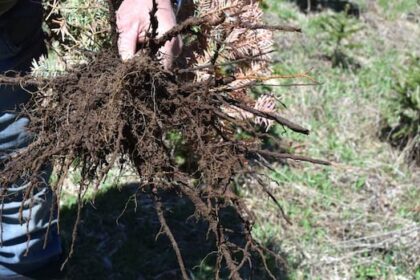The Cree Nation of Waswanipi in Quebec says it’s prepared to take drastic measures and evict people from community housing who are accused of dealing drugs. On July 2, the band council announced it would begin enforcing the section of its housing policy allowing the community’s Housing Commission to terminate leases and issue evictions if any “tenant or occupant is arrested for trafficking narcotics or […] other illegal business activities in or from a rental unit, or if illegal substances have been found in the rental unit” by housing employees or police, reads the public notice. “We’re here because our people have expressed the want for this,” Chief Irene Neeposh tells APTN News. “As elected leaders, we’re working really hard to carry that vision and enact the vision that was set out by the community.” Waswanipi is located about 735 kilometres northwest of Montreal. A public notice from the band announcing the new approach emphasizes that evictions will apply to everyone in a rental unit where one person is alleged to have sold drugs. “This consequence does not only affect the individual involved in the illegal activity,” the notice stresses. “It impacts everyone residing in the unit, including children, elders, and other innocent occupants.” Neeposh says she’s aware of the possibility that a person dealing drugs might have children in their dwelling who’d be subject to eviction. “We haven’t evicted anybody with children, thank God,” she says. “And I hope I don’t see that. But we have a [homeless] shelter, we have a woman’s shelter, so they’re not on the street.” Neeposh acknowledges this policy is severe, though she says she balances it against the potential harm to a community grappling with the increased prominence of methamphetamine and potentially fatal fentanyl. “Them getting evicted is a very, very light sentence compared to if they should take a life from what they’re selling,” Neeposh says. Read More: ‘We’re in a war’: Dakota Tipi First Nations turns to evictions to curb drug trade Drive by shooting, violence prompts Nisichawayasihk Cree Nation to announces drastic measures Court strikes down 5-day government enforced evictions in Yukon In the last two months, prior to the eviction order, the Waswanipi detachment of the Eeyou Eenou Police Force (EEPF) has made three drug busts. EEPF press releases say they charged community members with possession of substantial quantities of substances believed to be cocaine and methamphetamines. Other EEPF detachments have made similar busts this year in the Cree Nations of Chisasibi, Waskaganish, and Wemindji. Yet Neeposh says she’s trying hard to take a firm position without being hardened by it. She adds that she wants her whole leadership team to understand the evictions do not reflect the rejection of individual people, but of their actions that are threatening to Waswanipi Eeyouch. “It’s not winter and we’re not banishing our people,” Neeposh says. Those who’ve been evicted can find a place to stay in the community’s homeless shelter or cultural camps on the land, she says, while many of those in the community have large extended families who can take them in. “I tell my housing department, when you hand that eviction notice, I want you to have in the other hand an application form that you’re going to give them,” she tells APTN. Neeposh adds that she hopes being returned to the housing waitlist forces evicted people to reflect upon their actions, get help for addictions, and understand the harm they did to their fellow community members. The terms of the new policy are unforgiving. Though Neeposh says those caught with smaller amounts of drugs for personal use will not face the threat of eviction, but a tenant can be evicted, along with their family, if a quantity of drugs large enough for trafficking is found in the dwelling. Neeposh adds there is no need for charges to be proven under law. Though Waswanipi struggles with the recent influx of dangerous drugs—like many of the other eight communities of the Cree Nation of Eeyou Istchee—the Nation is also grappling with a housing shortage. In Waswanipi, 20 per cent of the population of fewer than 500 is on the waiting list for housing. Neeposh says anger against drug dealers has merged with frustration about access to housing. While it’s hard to measure community sentiment, responses on Facebook have been largely positive. Some members who posted on social media praising the decision declined to speak to APTN out of fear of retribution from drug dealers. ‘That’s kind of drastic’ says community member Activist, artist, and former electoral candidate for provincial party Québec Solidaire, Maïtée Saganash is a member of Waswanipi. In December, she says, she was evicted with two weeks’ notice after the housing administration office determined she was living in a house large enough to accommodate a family. Saganash says the housing office didn’t offer a smaller dwelling for her to move into or money to help her move on short notice. As a result, she says she felt forced to relocate from Waswanipi, where she paid $500 for band housing, to Montreal, where the only housing she could find was $1,900. Having been open about her process of moving from addiction to recovery, Saganash says she has great sympathies for community members concerned about drug trafficking. While she feels her eviction was unfairly handled, she also understands the dire need for housing. But she finds the severity of the eviction policy excessive. “That’s kind of drastic,” she says. “I understand that people want healthy communities, that they don’t want people to use, that they’re trying to [stop that]. But I don’t think evicting everybody out of the house and punishing people, and taking away the right to housing from people who didn’t deal, is the way to go.” Saganash says she finds the prospect of widespread evictions worrying. “I think there’s going to be collateral damage. Maybe children of people who sell, Elders of people who sell, anybody living in the house [being evicted]. That’s what I’m concerned about,” she says. Northern Indigenous communities haven’t embraced the strategy of harm reduction for drug use the way southern communities have, Saganash notes, and she’d like to see those approaches in the Cree Nation. “We might as well work with the people and work where they’re at,” she suggests, “rather than exclude them and outcast them. When you stigmatize [people who use drugs], I think you’re very much not encouraging people to get better or at least get help.” Neeposh agrees that the long-term aim for her community is to provide help for members who want to stop using drugs. Her office has recently secured funding for two recovery positions, and she says they’re also funding land-based addiction-recovery programs. “We are working with our local people, we’re bringing in trainers to train people,” she says. “We’ve already run three cohorts since I was in to train people, and we just got word that we have three members that have joined the McGill Bachelor of Social Work programs. We’re just constantly, constantly trying to build the resources.” In the end, she stresses she hopes the band doesn’t have to evict anyone at all, and that the policy will act as a deterrent to drug traffic in community housing. “With all these notices we’re doing, these are warnings,” she says. “So even if you look at the notice, it says pretty much, ‘think twice.’” Continue Reading
Cree Nation of Waswanipi threatens evictions for people caught with large amount of drugs

Leave a Comment










